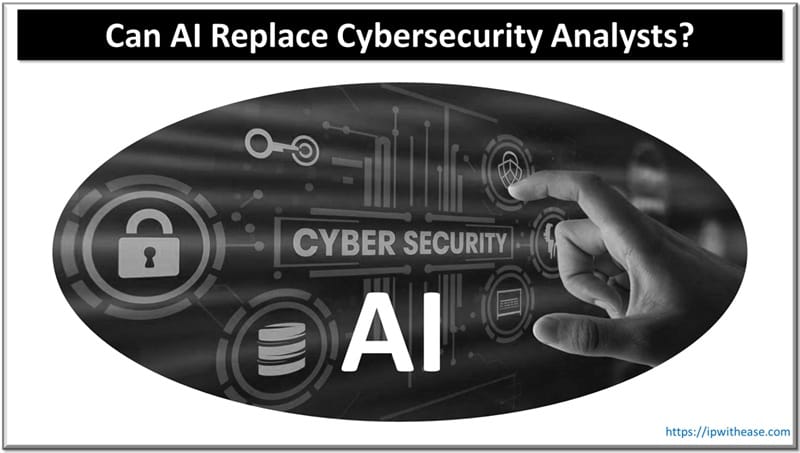Table of Contents
Since AI started dominating the digital world, everyone had one question in mind popping up. Will AI or artificial intelligence be going to replace cyber specialists? Who will address this elephant in the board room?
There are a magnitude of reasons due to which the IT job market is facing turbulence – global market uncertainty due to tariffs imposed by US govt, cutting down job force and automation of repetitive tasks, H1B visa fiasco and so on.
With the advent of AI, the global cybersecurity threat landscape is under transformation. Will cybersecurity specialists be able to handle the kind of sophisticated attacks being launched by hackers with the aid of AI.
AI and LLM modules are good at processing vast amounts of data, finding the patterns and providing quick responses but think AI as a tool and not the human skill replacement.
In this article we will learn more in detail about how AI is augmenting the cybersecurity space instead of replacing Cybersecurity Analysts.

AI in Cybersecurity
It does not hold true that we have started using AI suddenly in the cybersecurity space. We have been using AI in log data analysis, to identify patterns and trends and polymorphic code for the last twenty years. AI and machine learning is being used to identify phishing mails and callout deviations from baseline.
If we go deeper in Security Operations Centers (SOC) working we will understand that improved AI capabilities would mean less looking and analyzing log outputs, less human triage of incidents. This simply means monotonous, repetitive and redundant tasks can be automated using AI and ML without significant involvement of humans.
Threat advisories do use AI and the malicious actors using these advisories have only one intent – sabotage, damage and extract money. The ransomware attacks increased multi-fold during 2010. But the fact still remains intact that even the best advanced machine learning tool has a hard time to detect if an administrator logged in from an authorized source is a legit user or impersonator who has stolen administrator credentials.
We need to have an understanding that
- Computers will always be good at detection of computer automated logic
- Computers have difficulty in detection of human driven logic and they never be
- Adversaries will always have same motivation to invest in AI and humans both
But human defenders are always the first line of defense in security with support from advanced detection and task automation tools.
Ongoing Debate: Can AI Replace Cybersecurity Analysts
AI cannot replace cyber analysts provided you are not using cyber analysts only for analyzing logs and pushing a set of buttons. Cyber analysts bring nuance and they understand environment specific context and know the difference between ‘expected but weird’ and ‘this should not be happening’. They better understand who is likely to make mistakes, critical systems.
- Since AI lacks institutional memory, it does not know what matters to organizations. In fact, we need humans more now in the age of AI – lesser log analysis, contextual analysis, strategic escalation instead of click through triage.
- AI isn’t good enough for a job which requires ethics, human behavior, impartial judgement and human intent understanding.
- During a security incident, human judgement is something which matters the most such as do we inform legal? do we escalate to stakeholders and leadership, is activity actually malicious or resulted due to some misconfiguration in systems. AI cannot answer these questions without relying on historical decisions made by humans.
- AI also has bias or trust issues as it is trained on existing data sets (Human knowledge gathered over years). The lack of understanding on how AI systems work puts organizations at the risk of normalizing the bad decisions. AI lacks the flexibility and bi-directional reasoning which is natural to humans.
Related FAQs
What tasks can AI automate in cybersecurity?
– Threat detection and alert triage
– Log analysis and anomaly detection
– Malware analysis and behavior monitoring
– Patch and vulnerability prioritization
– Automated incident response (limited scope)
Can AI make cybersecurity jobs obsolete?
No, but it can redefine roles. Analysts shift from manual detection to:
– Supervising AI systems
– Investigating higher-level threats
– Threat hunting
– Strategic risk mitigation
– Incident management and forensics
AI augments, not replaces.
What new skills should cybersecurity analysts learn because of AI?
– AI/ML fundamentals
– Security automation tools (SOAR, SIEM integrations)
– Prompt engineering for security workflows
– Threat analysis for AI-driven attacks
– Cloud and zero-trust architecture
Can AI be used by cybercriminals?
Absolutely. Attackers use AI for:
– Automated phishing
– Deepfake social engineering
– Exploit discovery
– Password cracking
– Evasion techniques
This increases the importance of human analysts.
Will future cybersecurity be mostly AI-driven?
Likely. AI will take over most low-level monitoring and response tasks. However, human oversight, governance, and strategic defense will remain essential.
ABOUT THE AUTHOR

You can learn more about her on her linkedin profile – Rashmi Bhardwaj



